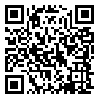Urbanization is one of the most significant global changes. The rapid growth in urban area is
imposing high pressure to land and their resources. With regard to various ecological services of the Hyrcanian ecosystems and the necessity to conserve them, this research aimed to investigate the growth trend of urban areas and their impacts on land suitability of the conservational patches in Korganroud watershed, Guilan Province. First, the undeveloped parts of the watershed were divided into two main ecosystem types of forest and rangeland. Then, for each ecosystem type, required parameters of the CAPS Model (land capability and ecological parameters) were calculated and combined using linear combination approach. In total, 14 different zones with an area o 64,541 hectare (19% of the watershed‘s area: 13% jungle and 6% rangeland ecosystems) were distinguished as conservational patches. Simulation of the urban growth was done using a Markov-Cellular Automata Urban Change Modeling method called SLEUTH. We designed three different scenarios of historical, managed and ecologically sustainable growth for the period of 2008 - 2050. Finally, integration of the results of two approaches was implemented using a loose coupling approach. Results reflect a general trend in decline of patch suitability influenced by type and size of the urban area growth. According to the results, the observed changes in urban growth for the historical scenario provide a development approach different to the changes for the other two scenarios which collectively fall in another approach to development. Thus, conservational suitability of the area can be preserved by changing the development approach and harnessingcurrent trend of the urban area growth.
| Rights and permissions | |
 | This work is licensed under a Creative Commons Attribution-NonCommercial 4.0 International License. |



